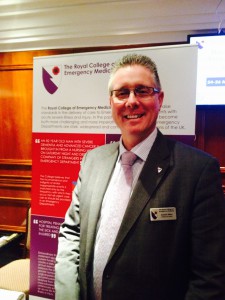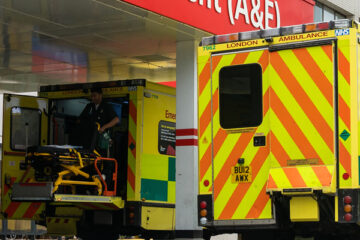Guest post: Modernising EM & the College
 Guest post from RCEM Chief Executive, Gordon Miles.
Guest post from RCEM Chief Executive, Gordon Miles.
I joined the College in the autumn of 2010. A staff of 12 staff were my resources to help address the needs of 2,500 Members and Fellows. We had no property and rented some space from the Anaethetists. We rented space for our examinations and Study Days too.
My brief was to get the College well established on a firm footing. That meant we needed a home of our own. We found one and that purchase at £2.925m is now worth around £8m just a few years later despite the City of London property market being uncertain with Brexit looming. We purchased Octavia House next and the business case was made on the basis we would save money renting space for our OSCEs. Our longer term property strategy is likely to see regional presences being established.
When I asked the President about the resources put into his hospital he spoke of billions of pounds. At the College we have a budget of millions and our annual income is just over £6m this year. Compared with our own individual household budgets these figures are vast, almost too large to be meaningful, and yet compared to the tasks we need to address they are simply insufficient.
Expectations on the College are high. And rightly so. For many years we have punched above our weight and perhaps now that is taken for granted. Comparing ourselves to other Colleges who have been in existence for 500 years as opposed to our ten is not always the answer. However to put this into perspective, the Royal College of Physicians staffing is nearly 10 times ours – they have 418 people on their books compared with our 43. For example there is a 30 strong policy team at the Royal College of Physicians whereas we have valiant 3 employees. In every area at RCEM our people have a wide range of duties they cover for example our Examinations Team are working across the globe.
So, we are small, but we are growing. We are motivated and determined to keep delivering for the specialty. And just like the specialty we are expanding in reach and ambition.
There are advantages in being compact. We can be faster to respond, our internal lines of control are short. Decision making can be fast. Does that speed reduce the quality of our decisions? Only you the members can say. I think not, because we don’t sacrifice quality for speed, we are measured and thorough but also pragmatic and action focussed. The emergency physicians that help us on over 50 Committees are used to a fast paced environment and that is embedded in the College culture.
My aim was to provide the Council of the College with the resources they need whilst building an infrastructure for the future so that as the years roll by the specialty of Emergency Medicine is safe within an infrastructure that will stand the test of time.
Our staffing has grown as we support the fastest growing medical specialty in the UK. As our membership has grown we have been able to invest in more staff to work with trainee doctors, more staff working on Policy, Quality in Emergency Care, Membership, RCEM Learning and Examinations. As our activity has increased we have needed more staff in Finance and Facilities.
We now have over 7,800 Members and Fellows. Our international reach is expanding. Our examinations are in demand across the globe.
Where we have established ourselves as a benchmark in other nations, local organisations are forming and growing and beginning to challenge us so we cannot take for granted that what we have built will be sustainable in its current form for the future.
Our international work brings with it a strategic challenge: how do we meet the demands of helping other nations build emergency medicine systems on a relatively small resource base?
One answer may lie in fundraising. We have set up the RCEM Foundation, but how do we quickly raise significant funds to achieve the research and development goals we have set ourselves? The RCEM Foundation is at an early stage and whilst all donations and legacies are welcome we want this to primarily tap into corporate and wealthy philanthropic donation opportunities. So we are working on that presently. In the meantime, if you can help we are just launching a 10@10 campaign asking for a donation of £10 which represents just a £1 for each year the College has existed as this year celebrates the 10th anniversary of our Royal Charter. If you wish to donate you may do so here: www.rcem.ac.uk/10@10 . If you can help us with our wider fundraising efforts it would be great if you could contact me.
In the UK we are affected by the challenges facing the specialty: our Members and Fellows have less time to help with College work. The new generation of doctors seems to have a different attitude to professional bodies from the one before. How do we ensure that the value of what we offer is perceived, cherished and supported for the greater good of the specialty?
The answers for me lie in the membership survey results. It was generally positive. But that apparently good news hides a wealth of improvement opportunities. The specialty embraces new technology so we need to be at the leading edge of that in our communications. We need more podcasts, blogs, vlogs, perhaps webinars and to expand our RCEM learning offer even deeper and wider. Around 40% of our members and Fellows don’t come to our events, but there is a huge demand for elearning and streaming of our events, so we need to develop packages of learning that use the material in our Study Days and conferences and deliver it using technology to our Members and Fellows when and where they want.
If a Member takes maternity leave why can’t they login, complete some information about their planned maternity leave and let our system automatically calculate and set up the appropriate discount on their subscriptions?
When a Member passes FRCEM why doesn’t our system automatically update their membership records and welcome them to the Fellowship of the college?
Why is it that we have staff spending over 40 minutes per membership application scrutinising the information provided? Surely the system could automate much of this work?
So for me much of the answer lies in automation. I have established a ‘automation agenda’ to find processes that can be improved, then improve them and automate our processing.
My aim is to free our staff from the burden of routine processing so that they can become even more value adding to the membership experience. For the member a slick and easy to use, error free process should be a given.
If we were Amazon we would do this differently so why can’t we start our own revolution? We may not have Amazon’s resources but we can invest some of what we have in our automation agenda and make a change in the way we grow the support network for the specialty.
I think we can do this. We have achieved ISO9001 accreditation so we now have processes in place. The next step is to streamline and improve them, then automate them.
If you encounter a service or system as a user of RCEM services and you think: “Why is it done like that?” then let me know and I can add it to my automation agenda shopping list. I see our way to continue to punch above our weight is to automate more of what we do.
I’m looking for ideas on what we can quickly and easily improve for you.
I can’t promise that every idea will be able to be acted on immediately because we have a finite budget and a limited capacity, but we will add it to the list of improvement ideas that we are to prioritise and action.
Don’t hold back but do tell me.
Gordon Miles
RCEM Chief Executive
@gordonm1les


0 Comments